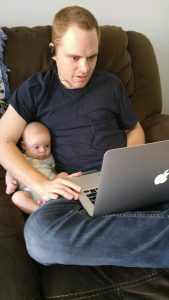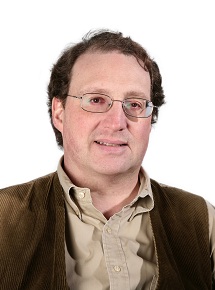The following is the continuation of a series of profiles on Loyola philosophy graduate students, giving you a brief sense of their thoughts on their research, teaching, and the value of philosophy. This profile covers Claire Lockard, 2018-2019 AGSP president.

- What made you become a philosopher?
Looking back now, I notice that I was accidentally doing philosophy back in high school when I took a Great Books class three years in a row – we read from themed anthologies in addition to reading novels that matched the theme. I remember reading Aristotle on happiness and Hobbes on the role of the state, for example. But since the course was sort of billed as an English class, I just thought I was reading cool books with my friends. I ran into my old Great Books teacher a few months back, and he admitted that he didn’t frame the class as one about philosophy, because he wanted students to be excited about it – that is quite funny to me because what it also did (though I don’t think he intended this) was attract lots more women than one typically finds in a philosophy class.
Even my more “formal” introduction to philosophy did not happen in a philosophy class – it happened, funnily enough, in a feminist theory course that was taught by a philosophy professor. Everything that we read and talked about in that class seemed to have this explanatory power that I hadn’t encountered before, even if it did not answer all the questions I had about what kind of a thing gender is, how best to navigate a patriarchal and oppressive social system, what it might mean for so many different feminisms to coexist, etc. I wanted to get better at formulating those kinds of questions, and using those questions to inform how I lived my life.
- Since you’re just finishing your coursework, what has been the most interesting class you’ve taken at Loyola, and why?
Definitely the Race Theory course that I took with Jackie Scott in the fall of my second year. Taking Jackie Scott’s class allowed me to approach questions of race through additional philosophic frameworks. I was particularly excited to think more about conceptions of race throughout the history of philosophy, and to explore José Medina’s work on epistemic oppression and epistemologies of resistance. Medina even came and visited our class on one of the days when we discussed his book, and I love meeting the philosophers whose work I am engaging with! I used so much of what I learned in the race theory class to write my master’s paper and I am still drawing from that course material to write my dissertation proposal.
- What specific idea or topic are you working on for your dissertation?
I am working on a project about the uses and misuses of the call for charitable interpretation in academic philosophy. Often, philosophers seem to take reading charitably or exercising the principle charity as an unambiguously beneficial approach to engaging with philosophic texts. I want to problematize that assumption, particularly when the call for charitable interpretation is made in response to a speaker’s critique of a text or author’s racism and/or sexism.
As it stands now, my central claim is that calls for charity are misused when made in response to concerns about authors’ or texts’ racism and sexism, and it becomes a disciplining move that contributes to unjust and oppressive epistemic conditions. “Charity,” as we use it in North American philosophy now, has racial, religious, and colonial history. In the current climate in academic philosophy, when we call on others to be charitable, we can contribute to what what I have come to call the charitability gap: while we are often willing to give generous interpretations to privileged (predominately white, male, upper-middle class) philosophers, that level of charity is not usually extended to marginalized voices. Additionally, the call for charitability is unevenly distributed – marginalized people in philosophy are, I suspect, more often told that we must be charitable in our interpretations and analyses. This charitability gap emerges, I suggest, because the call for charity is misused.
- You’ve published (in Feminist Philosophy Quarterly, an open access journal) some work on use of in-class focus groups in relation to getting more women involved in philosophy. What were your findings?
Our findings were quite specific to the philosophy department at Elon University (where we conducted the focus groups), but we hope that the results are at least suggestive of what might be at play for female-identified students involved in philosophy at other universities as well! We had three central findings:
- Taking only one philosophy class did not necessarily cultivate a growth mindset among female-identified students of philosophy. There is some evidence that female-identified students are more likely than male-identified students to adopt a fixed mindset about learning in general, where one’s skill at a given subject is based on inherent aptitude or genius (not so good for learning, because students are more likely to give up if they think they “just aren’t good at” a subject). Growth mindset, on the other hand, involves the belief that one can improve at something if they practice. We found that exposure to philosophy (by taking one course) did not convince students that philosophy was something at which they could get better.
- Course instructors have the potential to either ameliorate or reinforce students’ (mis)perceptions of philosophy. Many students in the focus groups we conducted mentioned that they stuck with philosophy at least partly because their professor told them that they were talented, or encouraged them in some other way. On the other hand, many students also mentioned that they had some instructors who reinforced the idea that philosophy is only for older white men with beards. Basically, as instructors, we might have more power than we tend to think regarding whether female-identified students feel encouraged to take more philosophy classes.
- Students who have not taken philosophy are likely to see their manner of thinking as being at odds with the manner of thinking required (or thought to be required) by philosophy. We had participants mention that they just don’t think philosophically, even though they had never taken a philosophy course before. Their ideas of what philosophy was and what would be required of them to succeed at it were already cemented, and often were in contrast with how they saw themselves.
That was fairly long summary of our key findings, so to put it another way, we found that there are tons of factors outside the philosophy classroom that are contributing to female-identified students’ reluctance to take philosophy classes, or to see themselves as unlikely to succeed once there.
- That article was coauthored with several other people. What did you find most interesting about co-authoring? What was most challenging about the collaboration process? Are there any pieces of advice for how to go about doing collaborative work?
The most interesting part of co-authoring was the way that, after such a long time (2+ years) working and writing together, we were able to predict the kinds of concerns that others would have, the kinds of changes they’d recommend making, and which part(s) of the project they would want to take the lead on. Co-authoring requires, I think, building a lot of trust over quite a bit of time, but it was an incredible experience that taught me more than most of my individual writing projects have.
One challenge of co-authoring is related to what can make it so generative: not everyone has the time or academic resources to work on a sustained project or to build up collegial relationships outside the context of paper-writing. I’ve done other collaborative work since this paper’s publication, and it is much more challenging when I do not know my collaborators as well!
- During your academic career so far, what have you changed your mind about? Has there been a figure or argument you initially thought was really wrong but have become more sympathetic to (or vice versa)?
I am going to talk about a topic that I thought would be boring, but that turned out to be quit interesting: Aristotle. I’ve never been very interested in ancient philosophy, and so when I signed up for Dr. Ward’s “Aristotle on Friendship” class it was really only because I needed to fulfill my ancient requirement. But I was really interested in the ways he distinguished between kinds of friends (even though I’m not so sure he’s right to do that!), and in the ways his friendship framework applies (or doesn’t) to the Greek tragedies we also read in that class. I even ended up taking a second class in ancient philosophy.
- Is there a figure that you would consider to be underrated that you think more people should engage with more?
Sara Ahmed’s work is read super widely in feminist philosophy, queer theory, and critical race theory, but maybe not so widely in other circles. She has written on queer phenomenology, whiteness, affect theory, living as a feminist, politics of diversity in higher education, willfulness, and more. Her work engages tons of figures from the history of philosophy, but always with a creative feminist twist. I find myself returning to her work over and over, for a variety of different purposes. For those new to her work, I would suggest her most recent book, Living a Feminist Life.
- Are there two or three sources–I’m thinking books and articles mostly, but feel free to include any other sources if you want–that you would recommend for thinking about your area of research and why?
I am going to cheat and do four – two articles and two books!
“Tracking Epistemic Violence, Tracking Practices of Silencing” by Kristie Dotson.
In this essay, Dotson provides a framework that has been quite helpful to me in thinking about when calls for charitable interpretation are misused. For Dotson, sometimes a hearer of testimony is so ill-equipped to listen properly/justly to a socially-marginalized speaker that once the speaker identifies this “testimonial incompetence, they withhold their testimony. Dotson calls this withholding “testimonial smothering,” which is a kind of coerced self-silencing. Silencing is one branch of epistemic injustice, and so I’ve been using Dotson’s analysis to understand what might happen (or what we risk) when we call for a marginalized speaker to be charitable, rather than engaging seriously with their questions or concerns about a text.
“Paranoid Reading and Reparative Reading, Or, You’re So Paranoid, You Probably Think This Essay is About You” by Eve Kosofsky Sedgwick
If you are looking for a charitable reading of the practice of reading, this is the essay for you! Sedgwick talks about the ways that a hermeneutic attitude of suspicion (inherited from Ricoeur) can turn into an unhealthy paranoia, where a reader expects that every text is problematic in some way, and goes looking for those problems from the get-go rather than being open to other, less harmful, readings of the texts. Sedgwick is such a joy to read, and her essay strikes a beautiful balance between acknowledging the reasons that we’d want to be highly suspicious of texts and then offering reasons that we’d want to take on a less suspicious approach as well.
Against Purity: Living Ethically in Compromised Times by Alexis Shotwell
Ask my colleagues how often I mention this book to confirm my obsession with it. Shotwell offers a nuanced analysis of “purity politics” – an approach toward the suffering and injustice of the world that assumes one can stand above the fray if only one makes a particular set of good ethical choices on an individual level. Shotwell starts from the assumption that we will always already be implicated in a mess that we cannot solve with our individual efforts (that we cannot solve at all, in fact). From there, she explores what sorts of ways of engaging in the world emerge. She covers issues of disability, environmental degradation, responses to the AIDS crisis, and more. What I take to be useful about her book for my project is that Shotwell helps us understand why we should not entirely reject, or entirely embrace, a charitable approach to philosophy. Either one would be a purity move – assuming that a text can be made to stand outside of its racism or sexism, or assuming that because it can’t, it must be of no use to us.
Epistemologies of Resistance: Gender and Racial Oppression, Epistemic Injustice, and Resistant Imaginations by José Medina
Medina is interested in both the epistemic injustices that make it difficult for marginalized people to participate in epistemic communities, but also in the resistant ways of knowing and understanding that they/we have developed in response to hermeneutic and epistemic marginalization. I have been using his work to think about how to know when one should offer interpretative charity – Medina suggests that one should allocate more charity when listening to marginalized speakers, because there is a higher risk of not properly understanding their testimony for. I’ve also been thinking about his development of particular kinds of epistemic virtues and vices, and the role the calls for charity might play in cultivating or reinforcing those. I also really recommend his book to anyone who wants to learn more about feminist philosophy, philosophy of race, or epistemic injustice/oppression.




